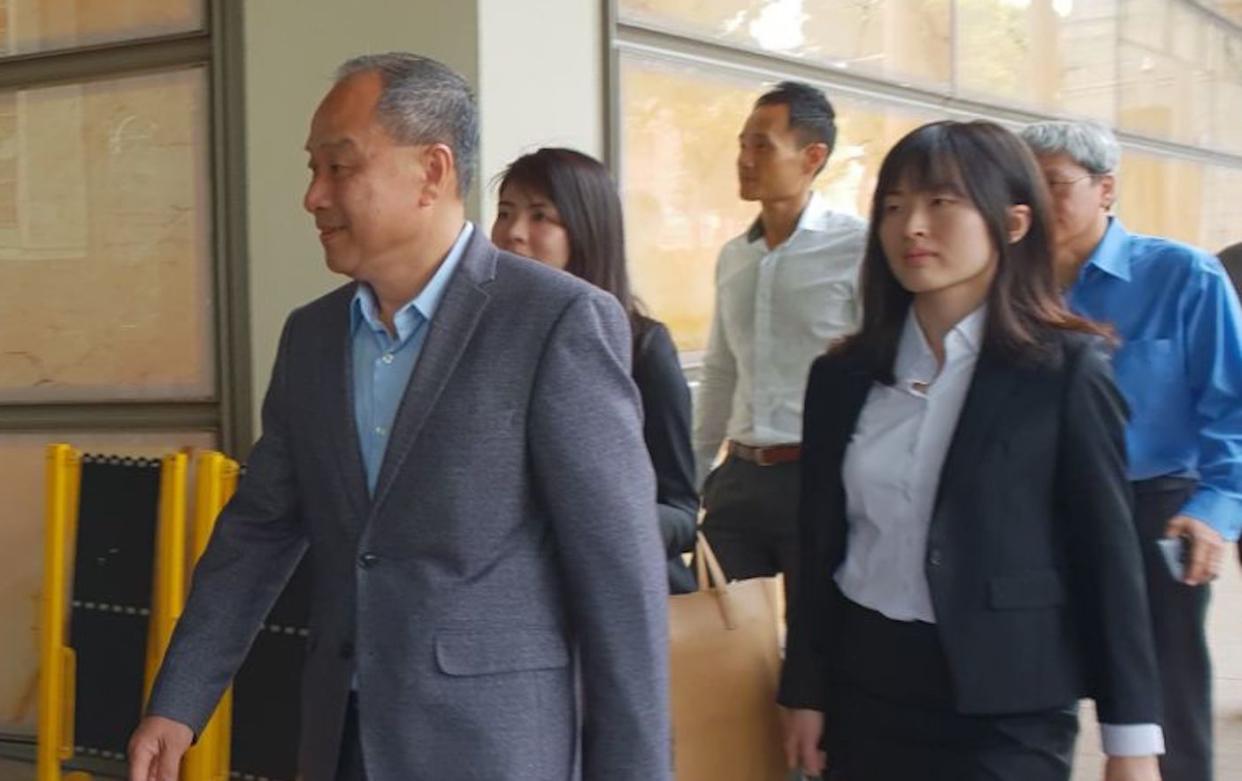WP AHTC town councillors 'acted in good faith, complied with the law': lawyer for MPs

The three Workers’ Party MPs at the centre of a high profile civil case brought about by two town councils did not break any laws, and acted in good faith and in the best interests of their residents, their lawyer told a court on Friday (5 October).
In his opening statement at the start of the hearing on Friday, Senior Counsel Chelva Retnam Rajah – who is defending WP chairman Sylvia Lim, former chief Low Thia Khiang and secretary-general Pritam Singh – called the law suit involving $33.7 million in alleged wrongful payments “clearly misconceived”.
Aljunied-Hougang Town Council (AHTC) and Pasir Ris-Punggol Town Council (PRPTC) are suing the trio, along with AHTC councillors Chua Zhi Hon, Kenneth Foo Seck Guan, WP supporter How Weng Fan and FM Solutions and Services (FMSS), which was AHTC’s former managing agent.
FMSS was set up in the wake of WP winning Aljunied GRC in the 2011 general elections (GE) and it took over from CPG Facilities Management. How and her late husband Danny Loh Chong Meng were directors and shareholders of FMSS.
The two town councils allege, among other things, a breach of fiduciary duties and improper payments made to FMSS and its service provider FM Solutions and Integrated Services (FMSI), between 15 July 2011 and 14 July 2015.
AHTC’s suit was initiated in July last year at the direction of an independent panel. Two months later, PRPTC initiated its suit.
AHTC was formed after the WP won Hougang SMC and Aljunied GRC in the 2011 GE. Punggol East SMC was won by WP in the January 2013 by-election and it became part of AHTC, which became known as AHPETC. After WP lost Punggol East in the 2015 GE, the constituency became part of PRPTC, and AHPETC reverted to AHTC.
AHTC’s lawyer David Chan said in his opening statement: “FMSS was subsequently allowed to manage the town council in a manner that was so flawed and so deficient that it allowed conflicted persons to approve payments to themselves. The circumstances were such: on one hand, we had FMSS and FMSI raising invoices; and on the other hand, we had conflicted persons with profit interests in FMSS and/or FMSI certifying that work had been done for those same invoices.” AHTC’s case is also that the defendants did not act in good faith.
Senior Counsel Davinder Singh, who is PRPTC’s lead lawyer, meanwhile, said in his opening statement: “Improper payments were made to benefit the elected members’ supporters who owned FMSS. The system of checks and balances in the town council was so lacking and flawed that it allowed conflicted persons to enrich themselves almost at will.”
Making reference to audit reports, he added: “It is striking that despite the KMPG and PwC reports, there is no honourable acknowledgement of wrongdoing. Instead of using the occasion of this inquiry (current hearing) to show remorse for what they did with public monies, they have come ready to use the witness stand as a soapbox to score political points.”
Senior Counsel Rajah, meanwhile, elaborated on the history and nature of town councils to show that they were set up to fulfil a political purpose, with MPs given full latitude and autonomy to manage them with little intervention from the government.
The lawyer said the duties – and penalties for breaches of duties – for town councillors are clearly spelt out in the Town Councils Act. “There is no basis for implying common law fiduciary duties … over and above the duties set out in the Town Councils Act and Town Councils Financial Rules given that the relationship between the town council and the town councillors is one that is created entirely by statute.”
The WP’s takeover of ATC was unprecedented; there had been no previous case of a large-scale takeover of the management of a town council from government MPs to opposition MPs, Rajah said. And CPG Facilities Management had informed WP MPs towards the end of May 2011 that it “would be bad for CPG’s business to be serving PAP town councils as well as a town council run by an opposition party”.
Nonetheless, Rajah said, “the WP town councillors carried out due diligence to determine if the alternative, FMSS, could undertake the role of the managing agent”, and town councillors ratified FMSS’ appointment.
He added in his opening statement: “The TCMS, which was the computerised management system used to run ATC, was terminated soon after WP took over ATC. The TCMS was provided by Action Information Management Pte Ltd which was owned by the PAP. The evidence will show that the lack of a proper computerised system greatly hampered the management of the town council in its early days.”
The lawyer added: “The plaintiffs and their accountants have chosen to ignore the above circumstances … in seeking to hold the town councillors to standards that are higher than that practiced by other town councils.”
Rajah told the court that Low would take the witness stand and testify before Lim. He would elaborate on the evolution of town councils to show that they are institutions with a strong political dimension, and point out historical difficulties faced by opposition town councils, including his own experience running Hougang SMC after the 1991 general election.
The hearing continues in the High Court on Monday (8 October) before Justice Kannan Ramesh.
Other Singapore stories
Singapore supermarkets push back against abandoned trolleys
SingHealth cyberattack: Malware used was initially thought ‘benign’ by antiviral experts
UK man charged with sending hoax about terror attack on NDP 2005



